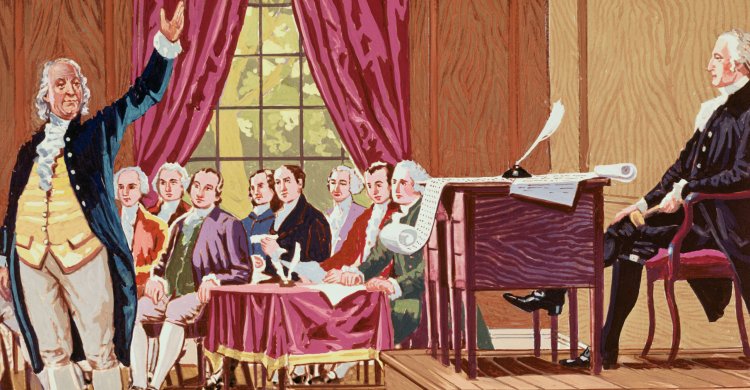Can We Overcome Progressive Left’s Constitution?
One day in 1990, Victor Fuentes dove into the ocean from Cuba and swam 7 miles to the American naval base on Guantanamo Bay, where... Read More The post Can We Overcome Progressive Left’s Constitution? appeared first on The Daily Signal.

One day in 1990, Victor Fuentes dove into the ocean from Cuba and swam 7 miles to the American naval base on Guantanamo Bay, where he would beg for political asylum.
He was, as the now-deceased Peter Schramm would have said, “born American, but in the wrong place.” Fuentes arrived in America in 1991 and started his life over.
He became a born-again Christian and a pastor. He would establish Solid Rock Ministries on 40 acres of land outside of Las Vegas with the purpose of healing the addicts and broken lives cast off by “Sin City.”
A key feature of the property was the stream that ran through it, the site of many baptisms and sources of renewal for participants. The ministry by measures both supernatural and temporal was a success.
And then the U.S. Fish and Wildlife Service visited Solid Rock Ministries, which was located on the edge of a national wildlife refuge called Ash Meadows.
In 1997, Congress had passed the National Wildlife Refuge System Improvement Act to bring regulatory unity to the haphazard system governing federal wildlife refuges.
Human use was not to be deterred, but respected and incorporated into regulatory goals. But the act’s statutory language to promote “effective coordination, interaction, and cooperation with owners of land adjoining refuges” sounds purposely broad, opening the door to administrative state discretionary use of power.
And that is exactly what happened.
In a display of the independent power of the administrative state, the Fish and Wildlife Service misled the Rev. Fuentes by failing to disclose its plans to divert the flow of the stream, cutting it off entirely from the property.
There was no “coordination” or “cooperation” with adjacent landowners. At some point, the Fish and Wildlife Service decided to “restore” native species, and that required rerouting the stream. They were just applying, per their expertise, the thick terms in the statute—standard fare, one might say.
Of course, the consequences for those whose rights are violated are hardly vague or ambiguous.
The Fish and Wildlife Service scientists made separate plans to divert the flow of the stream uphill and left Solid Rock Ministries to cope with several rounds of intense damage to its property, now stream-less.
Streams, apparently, don’t flow uphill well, particularly during intense storms.
Fuentes remains in litigation, his property rights seemingly without vindication. He surely doesn’t regret his 7-mile swim to America, but what he didn’t know is how the progressive left’s version of American constitutionalism leads to an entrenched phalanx of despotic busybodies who exercise immense power.
It isn’t Cuba, but it’s also not the Founders’ Constitution.
Tony Woodlief’s new book “I, Citizen” tells this story, and other powerful vignettes of how American citizens are no longer well-governed.
He’s really attempting to answer the question: Can America overcome its progressive left Constitution that has partially usurped the Founders’ Constitution? It’s a tall order. Woodlief’s conversational prose underscores that our current ideological politics, the concentration of power in Washington, and the emptying of American citizenship, is imploding America.
Woodlief further underscores how the progressive Constitution has changed our mores, our thinking, and our conception of citizenship. On our current intractable political conflicts, he reminds us that most Americans aren’t ideological and aren’t standing with daggers drawn ready to wage political war. The percentages of highly charged ideological Americans is in single digits. But this small number seems to comprise many people who shape the ant farm of America that we see.
Woodlief’s task then is to recover the Founders’ citizenship, and to do so requires that we reestablish the sovereignty of the people to govern their country in their name. Here, the people must govern—and not merely through presidential elections, but through deliberation by their chosen representatives.
That must mean, Woodlief declares, that judicial government and administrative state government are firmly brought to heel under the old standard of the principles of our American Revolution.
Citizens, though, aren’t natural; they are ineluctably shaped by the regime. Our regime’s goals are sharply contested between advocates of the Founders’ Constitution and the progressive Constitution.
The progressive Constitution shapes us into citizenship devoted to egalitarian abstractions. But equality is difficult to cage, to limit in its aims. As the 20th century worked itself out, equality of outcome emerged as the standard. Equality under law as the Civil Rights Act of 1964 promised to racial minorities and women was extended by the administrative state to equality of result.
Group rights emerged as a new standard of citizenship, slowly attempting to replace natural rights tied to human persons because of who we are in our nature.
Natural rights come with a component of pride, of knowing that human worth transcends the state, both limiting its claims on us and shaping how the state can use its power. Rights rooted in racial, ethnic, or gender identity have proved a more efficacious way to forming us into an equalities polyglot that can be managed, cajoled, and led by experts for their ends.
To that goal has now been added the equality of the indefinite extension of pronoun identities. Egalitarianism is a difficult god to serve, and the administrative state and its priests now do much of the lawmaking sacrifices for us.
Our preamble does not tie our Constitution to an egalitarian pinnacle to which we must pay our obeisance. Rather, the preamble looks to the classic fivefold ends of government: justice, peace, security, welfare, and liberty.
As Willmoore Kendall once remarked in a lecture that “Heaven can indeed fall” if we make an ideological abstraction the goal of our regime. And when it falls, it will hurt mightily.
The Constitution roots our country in a framework whereby law and policy emerge from “the deliberate sense of the community.” Representatives bring to bear their judgment, interests, and sense of justice that arises from the structured communities they live in and of which they remain part as neighbors, further eliciting their accountability to those communities.
There will inevitably be intense clashes of interests and claims for justice, but the morality of our Constitution is that they can be settled through delay, compromise, negotiation, and deliberation.
The majority will, ultimately, rule the land, but the difference is how that will is formed and then applied. Woodlief notes the political ignorance literature that concludes that given how inconsistent and misinformed the voter opinion is that an official technocracy would govern more rationally.
What if self-government is a cruel hoax? What if America really is an exception?
Publius sets forward an almost forgotten understanding of consent of the governed. That version of consent is given by citizens to the ethical bounds of policy made through their choice of representatives. Those representatives are sent by the voters from their communities because they are recognized by their neighbors to be of elevated character, capable of representing them, and doing so in a forthright and honest way.
And that process of congressional conversation and debate is the standard for the people to govern themselves. There is no real way for the people to understand the intricacies of policy, but their representatives can, and an ongoing conversation with them about their actions informs the punctuation of voting every few years.
We are obviously, by that standard, somewhat amiss. Woodlief quotes congressional scholar Kevin Kosar on the demise of Congress as a deliberative body: “The newly arrived legislator is quickly confronted with a few basic demands: raise money for reelection; obey party leadership; and don’t fraternize with members of the other party.”
Kosar illuminates congressional decline and weakness as being led by the need for members to pay, obey, and shun the enemy. There is also the emergence of the congressional representative as a star, who treats the institution as a platform for self-aggrandizement. Or as first-term congressional Rep. Madison Cawthorn, R-N.C., stated: “I have built my staff around comms, rather than legislation.”
“All hat and no cattle” comes to mind.
Congress created the administrative state and has steadfastly refused of late to discipline it with its Article I power that gives Congress pride of place in our constitutional order. A snapshot of this process would look to the New Deal Congresses that created much of our administrative state, a process further elaborated by the Great Society of the Johnson administration.
Power was accumulated by Congress and then dispensed to agencies to reshape our politics and to replace civil society with federal rules.
That scheme has slowly redefined the country. And the wages paid have been steep, as Americans realize that so much of what is local to them is really defined by the Capitol of the empire.
As Woodlief observes, “Everything from where our sons and daughters are sent to die in undeclared wars, to whether local libraries can restrict access to pornography, has been taken out of the hands of we citizens and our elected representatives. This decades-long overrun of freedoms large and small has subtly and methodically undermined the virtues essential to a free citizenry, and has replaced them with subservience.”
Woodlief closes by recounting an experiment conducted on middle-class Oklahoma boys by Muzafer Sherif in 1954. Sherif invited their parents to send them to his youth camp for leadership. He separated the camp into two groups called the “Rattlers” and the “Eagles,” and he instructed them to have no contact with one another except through planned competitions that were intended to stir anger and animosity between the groups.
Sherif’s grand objective was to understand how discord and violence emerged from competition and then to introduce shared community camp projects that would reunite them, eliminating their selfishness and pettiness through common pursuits. And that is exactly what he reported in his academic paper that became a famous study of social psychology vindicating planning, sharing, and expert administration of local societies in the name of cooperation.
But it didn’t work. The two groups of boys never hated one another. Sherif grew angry at their friendships. So, he deceptively stole things from the boys and blame was pinned on one group or the other.
After each work of intrigue by Sherif, the boys would find ways to reconcile. Those accused would show that they weren’t guilty. At one point, the two groups reunited around the Bible as evidence of their honesty. Sherif’s dishonesty in his long-praised paper was only uncovered in 2018.
Woodlief hints that it might be a key to what our ruling class does to us.
Ideological abstractions require ideologues to believe in them, and project them onto others. Many resist their ideological machinations, sometimes vigorously, leading to a bitter contest of wills. The task, then, is clear, according to Woodlief. We’re being driven to division against one another, led by a ruling minority and their symbol-mongers who carry their message to us.
Like the Rattlers and the Eagles, maybe we need to step back and ask ourselves what we have in common and how we can reconcile across our divisions. That’s the healthy version of liberalism.
But there’s no way to avoid how stark much of our differences now are in America. The real question is, can we forge our deliberative republic again, compelling us to find the common good through arguments that start in one place and that go somewhere, giving us more and better reasons to hang together, as opposed to separating?
Have an opinion about this article? To sound off, please email letters@DailySignal.com and we’ll consider publishing your edited remarks in our regular “We Hear You” feature. Remember to include the url or headline of the article plus your name and town and/or state.
The post Can We Overcome Progressive Left’s Constitution? appeared first on The Daily Signal.

















:quality(85):upscale()/2025/01/08/844/n/1922398/cde2aeac677eceef03f2d1.00424146_.jpg)


